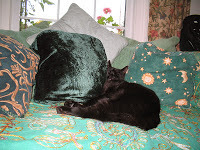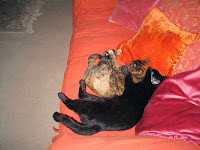Sue Noye Clark's Blog, page 2
December 1, 2013
PUBLICATION DAY!

My book, Dependence comes out in paperback today! I've been working towards this day since the beginning of April when I first emailed Matador for a copy of their Guide to Self-publishing.
What a lot's happened since then. Signing contracts. Sending my ms out into the big, wide, world (all those words that took so long to write, and all my characters who have become so real - suddenly, I felt protective and vulnerable). Getting it copy edited. Writing blurbs and bios and book descriptions for my book and my Author's Page on the Matador website. Sorting out cover images. Creating a blogsite (a lot of cussing and swearing until I got the hang of it!) Designing posters, leaflets, bookmarks, more posters. Distributing them. Distributing Advance Information sheets to bookshops and libraries and anywhere that would take them. Compiling Press Releases. Putting my book up as a giveaway on Goodreads. Uploading an excerpt to Book Goodies. Arranging a book signing...
There were days when I detested all the marketing and book promotion and just yearned to get back to my next book and write.
But it's worth it. All the painstaking trawling through sites to find "how-to" advice; all the googling, and searching, and letting the world - or a bit of it - know that my book exists and what it's about and where it can be found. It really is worth all the effort, and time, and patience - and if you're working on the marketing side of things for your book, don't lose heart, because you will eventually see results for all your hard work.
You can read about my journey to publication here
Published on December 01, 2013 06:00
November 25, 2013
BOOK SIGNING
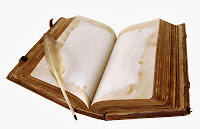
Last week, when I was in our local shopping centre, I popped in to have a look around a new shop/gallery which opened about six weeks ago.
It turned out to be a the pART Project, run by our local arts forum, to provide the opportunity for local artists - of all types and genres - to showcase their work.
The two people running the shop suggested I use it to do a book promotion/signing for my new book (they'd read about the book, and me, in the paper a couple of weeks before - result of the press release I sent out - proves it's worth the effort!). To be honest, I hadn't thought much about doing a book signing. Or rather, I've been thinking about it but not done anything.
I know that they are usually done in bookshops, but I think this venue will be perfect. It's quite small, so people will notice me - hopefully - and there are other things around to take peoples' interest. The place and the people are relaxed and friendly, and it's a comfortable place to be. And whereas before, I'd been thinking "Not particularly looking forward to book signing but know I ought to do it because it's getting my book and me out there" now I'm actually looking forward to the event.
After checking out various writers' advice and tips about doing book signings, I've come up with a Book Signing To Do List, which is on the Tips & Advice page
I've designed and am having printed some bookmarks and posters and have ordered some "Signed by Author" stickers. The sites I used are:
Centreprint online I went here to design my own, custom made, bookmarks. Pretty easy. Free postage. A couple of days after I sent order, I received a "proof" - after I'd confirmed by reply of email that I was happy with the bookmark design, they went ahead with printing. Based in Wolverhampton, they're a family business. Cost: £42 for 100 bookmarks
Zazzle This is where I bought my "Signed by Author" stickers. There are masses of different designs, and you can alter or add any word or words that you want. Cost: £6.97 (4.20 + 2.77 postage) for sheet of 20 stickers 1 1/2" (about 6.5cms) diameter
green2red I designed and ordered two posters (A2 size - 420mm x 594mm) from this site. Very easy to use. You can choose your own background colour (as you could with the bookmarks), font and font size, upload images, and all as simple as anything to move around, add, delete and generally mess around with until you've created the perfect poster. Cost: 2 posters £7.88 (3.94 each) + delivery £6.95 + VAT £2.97 = £17.80
If you live in the Sittingbourne area, you're very welcome to come along to the book signing of my book Dependence on Friday 6th December, from 10am until 2am, at the pART Project, The Forum, Sittingbourne. I'll be happy to chat and to answer any questions about the book.
For anyone living in Kent, the pART Project is at Unit 16, The Forum Shopping Centre in Sittingbourne. It's run by the Swale Arts Forum in collaboration with Litter Angels and the Sittingbourne Retail Association. Besides offering the space for local artists to exhibit and sell their works, it also offers an events space for individual exhibitions, talks, demonstrations or film show. Find it on Facebook at https://www.facebook.com/groups/127645453925960/
Published on November 25, 2013 07:24
TAKE IT EASY TODAY...alone... ...or with someone you...
Published on November 25, 2013 02:16
November 11, 2013
THE POWER OF WORDS
 Image courtesy of Sattva/FreeDigitalPhotos.net
Image courtesy of Sattva/FreeDigitalPhotos.netI watched a programme last week, Speeches That Shook The world, and near the end, its presenter Simon Armitage quoted some words from On The Sublime, written by the Greek writer, Longinus, around the first century AD.
"The effect of elevated language upon an audience is not persuasion but transport."
It just made me think that that's what I'd hope my writing would do - not influence or persuade anyone to my way of thinking, or doing, or being, but simply to be a means of transporting my readers to another world for a little while.
Published on November 11, 2013 04:42
November 5, 2013
ACCEPTANCE, ENTHUSIASM, JOY!
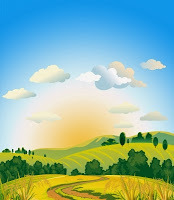
"Practice with an attitude of joy. Struggle never works"
This advice is on one of my yoga tapes. I know it's got nothing to do with writing, publishing, books and so on....
And yet it has. It can be applied to anything, really. Doing the Downward Dog, climbing a mountain, running a marathon, hoovering, digging the garden, cycling uphill, getting over a sad/bad relationship, wallpapering, learning anything new, meditating, adjusting to the passing of the years...
And writing! It's true - struggle doesn't work, and if I ever find myself locked in combat with a pile of words that just won't form themselves into anything remotely interesting, I tend to walk away and involve myself in something completely different.
And then when I return, even if I can't quite get that attitude of joy, I do try and bear in mind what Eckhart Tolle says in his book 'A New Earth':
"Awakened doing has three modalities, depending on circumstances and the nature of the activity. They are acceptance, enjoyment and enthusiasm".
No, I don't actually sit at my desk thinking "Awakened doing has....." etc, but it's true that approaching whatever you do with the attitude that you'll be either enthusiastic or joyful or at least, accepting, really does make a difference. Not always possible, of course, but, like most things, becomes easier with practice!
Sorry if I sound as if I'm preaching...I'm not, truly. Just sharing what does good things for me.
What does it for you?
Published on November 05, 2013 04:45
October 24, 2013
WRITING A BLURB - SOME GOOD TIPS
 IS THIS HOW YOU FEEL WHEN ATTEMPTING TO WRITE A BLURB?
IS THIS HOW YOU FEEL WHEN ATTEMPTING TO WRITE A BLURB?Your precious manuscript is going to become a book.The characters you created and who have become so real are going out into the big, wide world.You're feeling protective, proud, apprehensive and excited.
And then, at some point during the publishing process, you discover you need to write a blurb - a short summary of your book which will appear on the inside flap of a hardback jacket, or the back of a paperback. It's also used on online descriptions, posters, fliers & etc.
Creating a blurb is not an easy job. It is very difficult and very exasperating. You will probably write and re-write your blurb more times than you did your book. You'll write and delete, write and delete (or write and scribble out) until you're sick of it. Your head will buzz and, unless you are a saint, you will get quite cross. Or extremely cross.
Writing a blurb is one of the evil necessities of an author's life, and in my opinion ranks in the same category as going to the dentist's and cleaning the lavatory - necessary, but definitely not something you enjoy or look forward to.
But, I'm afraid, blurbs have to be written. So here are a few tips that have helped me, and links to sites which offer some excellent advice.
 Always keep in mind that the blurb is there to whet the reader's appetite, and to make them want to read your bookPractice writing blurbs about some of the books you've read and know wellDon't try, or expect, to create the perfect blurb immediately. This is impossible. Start by writing down what comes to you, and then cut back and prune, correct and re-write, and then cut back and prune some more until it's blurb-sizeAim for a blurb of about 250 words. This seems to be the average. Some people advise 150, others 300 and someone even suggested 500 words. Although this seems rather long to me, the blurb can depend on the size of the book, so if it's a huge tome, 500 words would perhaps be okayBegin with a short, sharp 'tag' line. Don't try to rush this bit - it's the worm on the end of the fishing line...Write in the present tense, and in the third personUse emotive wordsKeep sentences short and to the pointInsert a question that it's clear the book will answerTry to be objective - imagine you're writing the blurb for someone else's bookTry to cultivate a friendly feeling towards your blurbHave a look at the following sites:"How to Write an Effective Book Description" by Richard Ridley https://www.createspace.com/en/community/docs/DOC-1462
Always keep in mind that the blurb is there to whet the reader's appetite, and to make them want to read your bookPractice writing blurbs about some of the books you've read and know wellDon't try, or expect, to create the perfect blurb immediately. This is impossible. Start by writing down what comes to you, and then cut back and prune, correct and re-write, and then cut back and prune some more until it's blurb-sizeAim for a blurb of about 250 words. This seems to be the average. Some people advise 150, others 300 and someone even suggested 500 words. Although this seems rather long to me, the blurb can depend on the size of the book, so if it's a huge tome, 500 words would perhaps be okayBegin with a short, sharp 'tag' line. Don't try to rush this bit - it's the worm on the end of the fishing line...Write in the present tense, and in the third personUse emotive wordsKeep sentences short and to the pointInsert a question that it's clear the book will answerTry to be objective - imagine you're writing the blurb for someone else's bookTry to cultivate a friendly feeling towards your blurbHave a look at the following sites:"How to Write an Effective Book Description" by Richard Ridley https://www.createspace.com/en/community/docs/DOC-1462 "How to Write a Book Cover Blurb" www.lightmessages.com/lmjom/writing/229-how-to-write-a-book-cover-blurb.html
"How to Write a Book Blurb" by Alison Baverstock https://www.writersandartists.co.uk/self-publishing/articles/140/marketing-and-publicity/how-to-write-a-book-blurb
"Writing a Blurb? Some Key Tips by Goodreads http://www.goodreads.com/author_blog_posts/4009090-writing-a-blurb-some-key-tips
Good Luck!
Published on October 24, 2013 02:50
October 12, 2013
WRITING A PRESS RELEASE
 Image courtesy of ddpavumba/FreeDigitalPhotos.net
Image courtesy of ddpavumba/FreeDigitalPhotos.netIf you're an indie publisher, writing a Press Release is yet another thing that comes under the heading of "Marketing and Promoting Your Book".
You don't have to do one, of course. But I think it's a good idea, even if creating it will probably drive you to distraction.
The purpose of a Press Release is, like all book promoting, is to let people know 1) that your book exists and to generate interest in it, and 2) to give some info about you, the author.
In this case 'people' are 'the media' - journalists and suchlike, who are in a position to bring your book to the attention of potential readers.
I decided to write a Press Release. It took several days and gave me a stinking headache! I posted (not emailed) it to ten papers within roughly a forty-mile or so radius of where I live, using as a hook the fact that I am a local author.
Four days later, someone from one of the papers emailed to ask for jpegs of images of my book cover and of me - hopefully because they're going to write an article. A few days after that, another paper rang me for an online interview for a "piece about my book", which was published that same week.
I did a lot of trawling through the internet, finding out what a Press Release should contain and how to set it out and a whole host of info. You can read what I found out on the Tips & Advice page
I put my Press Release onto Biblioscribe (A free service allowing authors and publishers to submit press releases for free. Click here if you'd like to read it.
Published on October 12, 2013 07:47
September 28, 2013
DESCRIPTIVE WRITING
 Image courtesy of FreeDigitalPhotos.netWHAT IS DESCRIPTIVE WRITING?
Image courtesy of FreeDigitalPhotos.netWHAT IS DESCRIPTIVE WRITING?Describing a person, place or thing in a way that creates a picture in the reader's mindUsing as many as possible of the five senses - sight, hearing, smell, taste and touch - when describing somethingIncluding not only what is going on 'outside' the character who is describing something, but also the emotions and feelings it arouses 'inside'Not rambling on at great length using many flowery adjectives. This can become both tedious and meaningless. Descriptive words need to be relevant and precise in order to be powerfulUsing comparisons and/or contrasts to help reinforce the descriptionTHE FIVE SENSES
I think including as many of the senses as possible make a real difference when writing descriptions.
I recently went to Tuscany for a holiday. The scenery was stunning and I soon found myself grabbing a notebook to jot down descriptions of this, that and the other for future reference! Once home again, and reading what I'd written, I realised that
sounds - "the tinny chimes of the church bell" or "the lazy click-clack of someone walking along the narrow cobbled street down below".sight, smell (and taste) - "the mouthwatering lusciousness of the fat, red tomatoes roasting with garlic and rosemary and lashings of olive oil wafted out of the window as I gazed across the valley to the sun setting below the distant, silhouetted hills". It's almost impossible to bring to mind the smell of those oily, garlicky, rosemary tomatoes without also imagining how they're going to taste!smell, touch - after visiting a rather run-down, decrepit 12th century church, I wrote about the "musty, candle-scented air" and described how the "cold lifelessness of the marble under my hands, and the pigeon droppings on the floor, and dust everywhere made me feel sad that the church was so neglected".Our senses are vital in our inter-reaction with everyone and everything, and I think the more of them we use, the more of an affinity is created. If we put our minds to it, I'm sure we could all write a paragraph or two of fairly eloquent prose about the visual beauty of a tree. But to bring it to life in a reader's mind, we'd need to bring in more of the senses. The sound of its leaves, for example, rustling in the breeze. Or perhaps the creaking of an aged branch. And maybe we'd describe the feel of the ridged crustiness of the trunk against our hand. And that smell of earthy oldness. And what about that sense of feeling safe and protected when we stand close to a mature and venerable tree...
EXAMPLES OF DESCRIPTIONS USING SOME OR ALL OF THE SENSESWhen he opened his eyes the moon was full on his face. He could smell his own sickness on his flying jacket and he could feel, in a way that pained and troubled him, the beat of aircraft engines pumping and thundering in his left arm. This arm was also wet and hot. The terrible thump of engines beating down the arteries seemed as if they must finally sever the arm from his shoulder. (From 'Fair Stood the Wind for France' by H. E. Bates. First published 1944 by Michael Joseph)
Later, after they'd eaten a lunch of boiled eggs and potatoes with bread, Tariq napped beneath a tree on the banks of a gurgling stream. he slept with his coat neatly folded into a pillow, his hands crossed on his chest... Laila sat on the edge of the stream, dipping her feet into the cool water. Overhead, mosquitoes hummed and cottonwood seeds danced. A dragonfly whirred nearby. Laila watched its wings catch glints of sunlight as it buzzed from one blade of grass to another. They flashed purple, then green, orange. Across the stream, a group of local Hazara boys were picking patties of dried cow dung from the ground and stowing them into burlap sacks tethered to their backs. Somewhere, a donkey brayed. A generator sputtered to life. (From 'A Thousand Splendid Suns' by Khaled Hosseini. First published 2007 by Bloomsbury Publishing)
The scullery was a mine of all the minerals of living. Here I discovered water - a very different element from the green crawling scum that stank in the garden tub. You could pump it in pure blue gulps out of the ground, you could swing on the pump handle and it came out sparkling like liquid sky. And it broke and ran and shone on the tiled floor, or quivered in a jug, or weighted your clothes with cold. You could drink it, draw with it, froth it with soap, swim beetles across it, or fly it in bubbles in the air. You could put your head in it, and open your eyes, and see the sides of the bucket buckle, and hear your caught breath roar, and work your mouth like a fish, and smell the lime from the ground. Substance of magic - which you could tear or wear, confine or scatter, or send down holes, but never burn or break or destroy. (From 'Cider With Rosie' by Laurie Lee. First published 1959 by Hogarth Press)
My heart thudded. Not like before when it had just been beating a little faster than normal; now it thundered against my chest wall as if it was trying to escape and burst out of my body. When I closed my eyes everything was red and pimpled with stars. I could hear a strange sound, deep and gasping, and it took several seconds before I realised it was me, struggling for air... I held onto the drawer-knob for dear life. At that moment it was the only substantial object left in my world.The inexplicable panic continued to roar through me like a giant tidal wave... I opened my eyes and the wall came and went in a way which made me want to be sick. Armies of mice raced across my shoulders and down over my arms. I swallowed hard, only there wasn't anything to swallow. I was on the inside of a jagged scream which at any minute was about to explode into a million wounding shards. (From 'Dependence' by Sue Noye Clark. To be published 1st November 2013 by Matador)
Jack Firebrace lay forty-five feet underground with several hundred thousand tons of France above his face. He could hear the wooden wheezing of the feed that pumped air through the tunnel. Most of it was exhausted by the time it reached him. His back was supported by a wooden cross, his feet against the clay, facing towards the enemy. With an adapted spade, he loosened quantities of soil into a bag which he passed back to Evans, his mate, who then crawled away in the darkness. Jack could hear the hammering of timbers being used to shore up the tunnel further back... The sweat ran down into his eyes and stung them, making him shake his head from side to side. (From 'Birdsong' by Sebastian Faulks. First published 1993 by Hutchinson)
Ellen sat awhile listening to the soothing chirrup of the cricket and the pleasant crackling of the flames. It was a fine, cold winter's day. The two little windows at the far end of the kitchen looked out upon an expanse of snow; and the large lilac bush, that grew close by the wall, moved lightly by the wind, drew its icy fingers over the panes of glass. Wintry it was without; but that made the warmth and comfort within seem all the more. (From 'The Wide Wide World' by Elizabeth Wetherell. First published 1850)SOME MORE THOUGHTSLong descriptive passages are a thing of the past: today's readers have neither the time nor the patience for them. Therefore, whenever you include them, you have to make them work hard for you. They should paint in the background of the story, elicit some emotional response in the reader and be an integral part of the story, not merely an embellishment. They should also be painted vividly and briefly.A description of a threatening storm or a deserted landscape or a brilliant summer's day should convey something more to the reader than a mere picture of the setting. In the first two, the reader should experience an inner shiver of apprehension and a feeling that something is going to happen. In the latter, all is well for the character involved, at least for the moment. If a tiny cloud appears far off on the horizon, however, we know trouble of some kind is on its way before long.(From 'The Fiction Writers' Handbook' by Nancy Smith. First published 1991 by Judy Piatkus (Publishers) Ltd)
CHEKHOV'S ADVICE TO A YOUNG WRITER"In my opinion, descriptions of nature should be extremely brief and offered by the way, as it were. Give up commonplaces, such as: 'the setting sun, bathing in the waves of the darkening sea, flooded with purple gold,' and so on. Or 'swallows flying over the surface of the water chirped gaily.' In descriptions of nature one should seize upon minutiae, grouping them so that when, having read the passage, you close your eyes, a picture is formed. For example, you will evoke a moonlit night by writing that on the mill dam the glass fragments of a broken bottle flashed like a bright little star, and that the black shadow of a dog or wolf rolled along like a ball.'" (Anton Chekhov, quoted by Raymond Obstfeld in 'Novelist's Essential Guide to Crafting Scenes'. Writer's Digest Books, 2000)
Published on September 28, 2013 05:54
August 28, 2013
DISTRACTIONS and DELAYING TACTICS
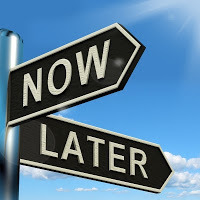 Image courtesy of Stuart Miles/Free Digital Photos.net
Image courtesy of Stuart Miles/Free Digital Photos.netIf things aren't flowing on the writing front; if I'm not "in the mood"; if I need to change/correct/rewrite something I find myself creating Distractions and Delaying Tactics.
I say "I", but we all do it, and writers seem to be remarkably adept at coming up with excuses and reasons to just put off getting back to PC, laptop, tablet, pen and paper when things aren't going smoothly, and sometimes, even when they are.
Here's a few examples of some DandDTs I came up with today:Decide to make Tomato Sauce as there's an abundance of tomatoes in greenhouse and we can't possibly eat them all unless we eat only tomatoes for every meal every day for the next week. Tell myself that sauce-making won't take longWhilst in kitchen, waiting for tomatoes to roast, instead of using the time to dash into Writing Room and write one or two hundred words, come up with idea of making pesto to put in freezer, something I've been meaning to do for past few days. Convince myself this is a very necessary job, as all five basil plants are now flowering, and their leaves are the size of saucers, and if I leave the pesto making even one more day, it will be too late.Make "To Take" list for forthcoming holidaySpend time in affectionate communication with catFinally, find some remnants of self-discipline, and go to Writing Room with great intentions; but
Make vow that tomorrow will get up early, and immediately after breakfast will go straight to Writing Room and write, despite whatever else is going in. Will ignore such things as ironing, cat-smoothing (unless cat is sitting on desk and this can be done whilst writing).
Will try to accept that Distractions and Delaying Tactics are all part of a writer's life, and so long as they don't happen too frequently, and I don't beat myself up for being weak and lacking in self-discipline, I'll accept the fact that maybe there's a reason I need to take a breather for a while, step back, smooth the cat, do a few unnecessary things, before returning to my wonderful world of writing.
I'd love to hear what distractions and delaying tactics you use.
Published on August 28, 2013 04:27
July 30, 2013
WRITER'S BLOCK - or Blank Mind Syndrome
 Image courtesy of Idea go/FreeDigitalPhotos.netYou must have experienced it – and pretty regularly, I’m sure, if you’re anything like I am. I call it Blank Mind Syndrome, or BMS for short.
Image courtesy of Idea go/FreeDigitalPhotos.netYou must have experienced it – and pretty regularly, I’m sure, if you’re anything like I am. I call it Blank Mind Syndrome, or BMS for short. You start out filled with ideas and enthusiasm and energy, as thousands of words skirmish inside, all raring to come out and be strung into magnificent sentences and paragraphs. You’re feeling creative and powerful and confident.
And then you sit down in front of the blank computer screen or piece of paper and suddenly you’re blank too.
What’s happened?
You make a supreme effort and write a few words. Then you read what you’ve written, realise it’s rubbish, sigh, curse, press delete and sigh again. You sit, adjust the jar with the pens in, fiddle with a spot or a fingernail, lean back, lean forwards, get up, sit down. You stare out of the window or at the computer screen or a blank piece of wall and disappear into a trance. This is all very well if you want to be meditating, but not if you're trying to write. You don't know you've been lost in a trance until you come out of it a couple of minutes later and realise you've been staring at nothing, and that your mind has not pestered you in any way for 120 whole seconds!
You think it may help if to go away for a few minutes, and decide to go and make a coffee. While you’re in the kitchen you think you’d quite like a slice of toast, and then you realise you haven’t phoned the person you’d said you’d phone/put the bread in the machine to bake/booked that dental appointment, so you spend an hour eating toast, drinking coffee and performing unnecessary tasks before you return to your writing space.
Pepped up with coffee and toast, you decide you’re going to make a real effort. But nothing happens. You curse or weep, convinced your creative juices have dried up and that you will never write again.
This is Blank Mind Syndrome (BMS). Don't worry, it will pass, but there are ways to accelerate its departure.
Here are 10 tips I’ve found helpful when assailed by BMS:
1. If you’ve written something, don’t delete it. At least if you’ve begun to write something there’s a possibility it may gather momentum.
2. If you’ve started, try to continue writing. Even if you’re thinking it’s rubbish, even if you’re despairing that you’ll never write again, even if it actually is rubbish. Just carry on writing.
3. Don’t sit and fiddle with pen-jars and fingernails. Focus on what’s in hand.
4. Although it does sometimes help to leave something you’re having trouble with, and come back to it later, don’t leave something just because you’ve run out of persistence. Stick with it.
5. Don’t invent excuses to keep you from returning. We could all fill hours and days doing things simply to prevent ourselves having to wade through BMS.
6. Don’t be cruel to yourself: Your creative juices are still lush and plentiful and you will definitely write again.
7. Set yourself a time limit. Decide you will write, rubbish or not, for the next hour and not delete anything. Remind yourself that no-one but you is seeing what you’re writing and that while you are writing you’re getting the better of BMS!
8. Promise yourself a treat. This is entirely up to you, but you could think “Right, after 200 words I’ll have a coffee, after 500 a peach and a 10 minute break, after 1000 a haloumi and hummous wrap…….” Whatever does it for you.
9. Don’t correct as you go along. Let it flow. If you stop to change a word or a description, you’ll interrupt that flow.
10. Forget the staring at the wall trance. Why not try meditation? It will surely help to change Blank Mind Syndrome to Blissful Meditative State!

Image Courtesy of Master Isolated Images/FreeDigitalPhotos.net
Published on July 30, 2013 11:27

